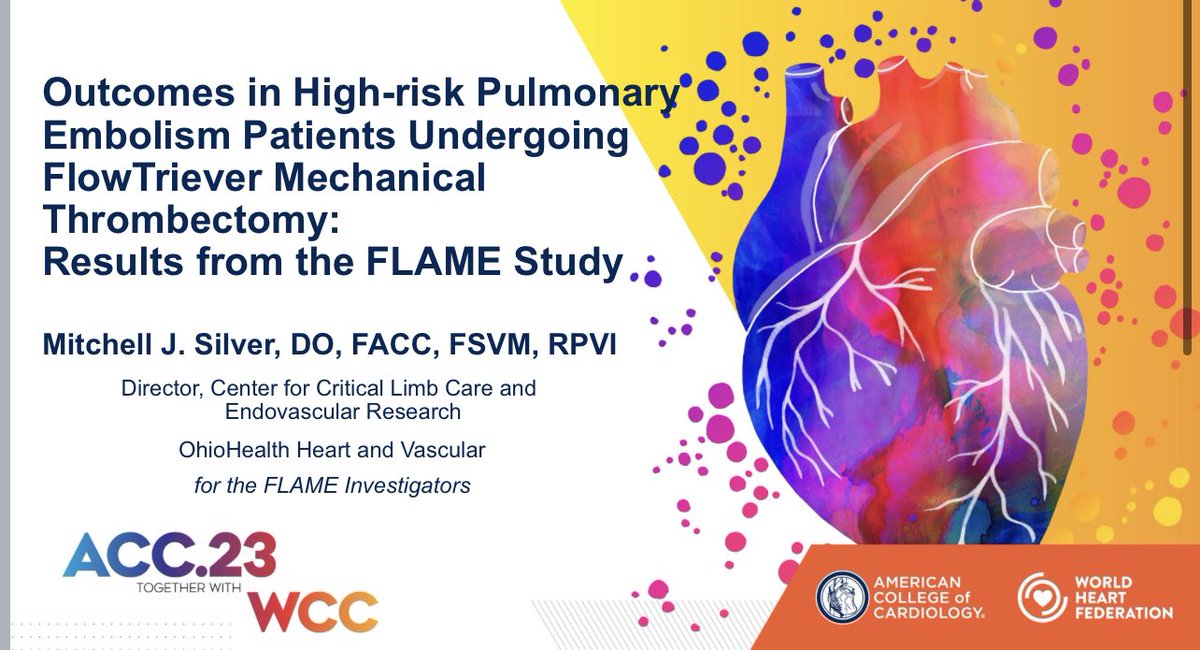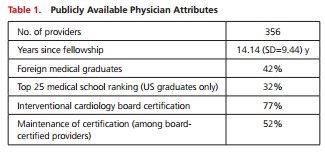
🧵 @InariMedical FLAME trial (largest ever high risk PE study) presented today @ACCinTouch #ACC23 by Mitch Silver!
Details in this thread below
Details in this thread below

2/ The FLAME trial was 2 parallel prospective registries of high risk PE patients at 11 US hospitals. All patients had hypotension or arrest.
One arm (n=53) included pts treated with Flowtriever large bore embolectomy.
Pts in “context” arm (n=61) treated with other therapies
One arm (n=53) included pts treated with Flowtriever large bore embolectomy.
Pts in “context” arm (n=61) treated with other therapies

3/ There were few exclusion criteria so the aim was to enroll a very sick population.
Each arm was compared to historical benchmark of the primary endpoints that was derived through an observational SRMA that was recently published @MyJSCAI :
jscai.org/article/S2772-…
Each arm was compared to historical benchmark of the primary endpoints that was derived through an observational SRMA that was recently published @MyJSCAI :
jscai.org/article/S2772-…

4/ Patients in both arms were very ill. Advanced @SCAI shock class C or worse in about 75% of Flowtriever arm and 90% of context arm. 

5/ In the context arm, approx 70% of patients received systemic TPA. This is not surprising as this currently has the strongest guideline recc in this population.
Very few patients in either arm received mechanical circulatory support.
Very few patients in either arm received mechanical circulatory support.

6/ In hospital mortality was as follows:
Flowtriever arm: 2%
Context arm (largely TPA): 30%
Historical benchmark from SRMA above: 29%
Other relevant endpoints are below
Flowtriever arm: 2%
Context arm (largely TPA): 30%
Historical benchmark from SRMA above: 29%
Other relevant endpoints are below

7/ Main takeaways:
1) We can do prospective studies of high risk PE patients!
2) Systemic TPA shouldn’t be algorithmically used in this population as a primary txment.
3) PERT teams can select appropriate pts for large bore embolectomy- and this approach has great results!
1) We can do prospective studies of high risk PE patients!
2) Systemic TPA shouldn’t be algorithmically used in this population as a primary txment.
3) PERT teams can select appropriate pts for large bore embolectomy- and this approach has great results!
8/ For more great info on high risk PE, please see recent @AHAScience Statement led by @GoldbergJBCTMD:
ahajournals.org/doi/10.1161/CI…
Also, stay tuned for @PERTConsortium registry data on this population in the fall led by @TaiKobayashiMD
ahajournals.org/doi/10.1161/CI…
Also, stay tuned for @PERTConsortium registry data on this population in the fall led by @TaiKobayashiMD
• • •
Missing some Tweet in this thread? You can try to
force a refresh






